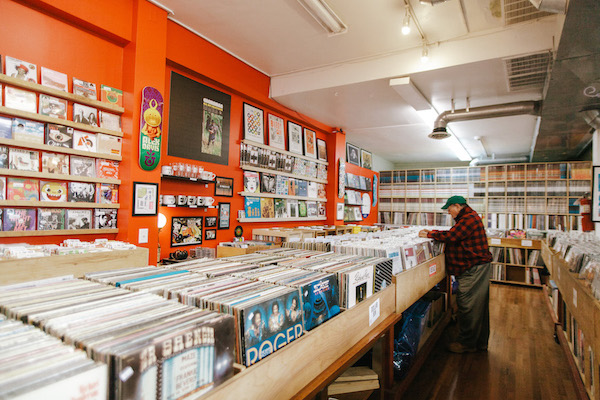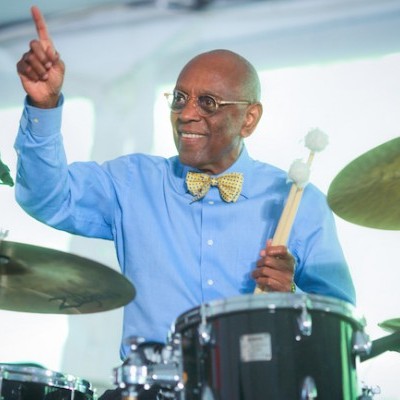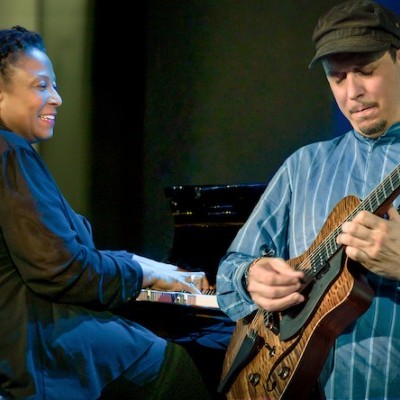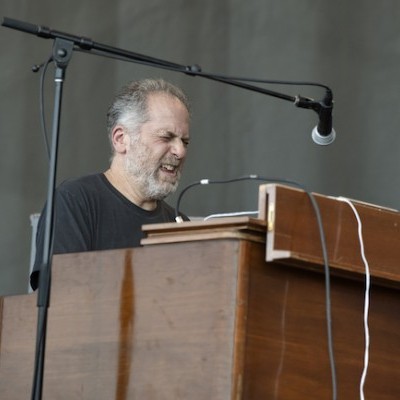Apr 2, 2024 12:59 PM
Saxophonist, Sonic Explorer Casey Benjamin Dies at 45
Casey Benjamin, the alto saxophonist, vocalist, keyboardist and producer who stamped his distinctive sounds on the…

Plaid Room Records in Loveland, Ohio, will open its doors for a Record Store Day drop on Aug. 29.
(Photo: Plaid Room Records)Record shop owners, some of whom have struggled during the pandemic, are hoping that a retooled version of Record Store Day will draw customers back through their doorways.
In the last dozen years, RSD has grown into a bi-annual tradition, celebrated most significantly in April and then again on Black Friday in November. But like everything else this year, it has been upended by COVID-19 and its accompanying restrictions on everyday life. RSD had been scheduled for April 29, but on March 13, organizers announced that it would be postponed to June 20. Eventually it became clear that late June would not be a safe time to host an RSD event, which typically includes in-store performances, refreshments and densely packed lines of customers eager to purchase exclusive vinyl releases.
On April 29, organizers announced a new plan: RSD would be retooled and held on three dates: Aug. 29, Sept. 26 and Oct. 24. Each of the three events will feature an inventory of LPs by numerous jazz icons, including Ron Carter, Miles Davis, Bob James, Charles Mingus, Sun Ra and Charlie Parker.
Organizers are referring to these three Saturday shopping events as “RSD drops.” For business owners, the good news is that these events are likely to draw in customers who have stayed away during the pandemic. The challenging question is this: How does a store hold an RSD event safely (and hopefully profitably) during the pandemic?
Adam Rosen, owner of Shuga Records in Chicago, termed the retooled RSD a “Band-Aid,” and said that organizers’ rules about when and how releases can be sold—only at a brick-and-mortar location for the first day, then online but only with a previously established, branded online presence, with limited amounts of titles per customer and no customer holds or pre-sales—make it difficult to plan a large-scale shopping event, given the current public health crisis. One major change from the past is that organizers are allowing stores to start selling stock online 1 p.m. EST on the day of release for the three RSD drop dates.
“No store really knows what the hell they’re going to do,” Rosen said, pointing out that a city such as Chicago could go back into quarantine during the time these RSD drops are scheduled. “If the world gets even worse, stores have to make their own decision on what’s actually safe.”
Regardless, Rosen has a plan for Shuga, which currently has more than 20,000 jazz titles for sale and, he estimated, another 65,000 in its warehouse, not yet listed. To prepare for Aug. 29, the store is going to put markings at six-feet intervals down the sidewalk outside its location on Milwaukee Ave to help shoppers line up in a socially distanced way. “We have a program that was built for our website that we can basically go down the line and ask people what they want,” Rosen said.
Each customer will be given a number and Shuga employees will collect their contact information. “If it all works out, you won’t even have to wait in line,” Rosen explained, comparing this to a restaurant’s paging system. If fact, for now, because it was built for restaurants, the program will text people a message that their “table is ready,” at which point they should report back to the store. Rosen said, “If people want to sit in line, they can, but they can go back to their car or go to [a grocery store] parking lot and hang out.” Using this system, Shuga will be able to adhere to its current limit of allowing no more than six people at a time in the store.
Bob Cole, co-owner of Plaid Room Records in Loveland, Ohio, tentatively reported a similar plan for the first RSD drop date. The store closed its doors on March 12, and it will reopen on Aug. 29.
According to Cole, online sales represented 40 percent of the shop’s sales before the pandemic. “We started really just upping our online presence, adding more listings, expanding into Discogs, more expanding into eBay, and it went surprisingly well,” he said. “Our online [sales are] up over 400 percent right now. In a weird way, we’re doing more right now closed than we were when we were open.”
Plaid Room—which, in addition to its retail location, runs a jazz, funk and soul label called Colemine Records—will require customers to wear face masks and sanitize their hands upon entering, with no more than 15 customers in the store at a time. Beyond that, it will also rely on a numbering system.
“Once you have your number, you’re free to go,” Cole said, suggesting his customers might visit nearby bars or restaurants during their shopping trip. “Our stock is displayed live on the website. You can’t buy it [yet], but it shows you how many copies we have in real time. Most folks just refresh [their web browser] every 10 or 20 minutes to see how fast it’s moving. It moves pretty slow.”
Cole said this system will prevent customers from congregating, but he wasn’t exactly happy about that. “One of the most fun parts of [a traditional Record Store Day event] is hanging out with all these record people,” he said. “The first 20 people in line, they all know each other by first name now just because they’ve hung out here for so many years doing it together.”
Hopefully, all of this will help record stores, which was the initial idea behind RSD in the first place. According to Brenna Gentry, co-owner of Luna Record Shop in Franklin, Tennessee, it’s very much needed. She said that even a power outage caused by a natural disaster is a threat to some stores, so the significance of the pandemic is enormous.
“If you’re shut down for a week or two and you don’t have any sales during that time, that’s almost enough to take most shops out,” Gentry said. “It’s not like some giant booming business that you’re possibly just sitting on cash, because you’re always buying. Money is going out at all times. You have to have the sales come in each day, no matter what.”
So when the coronavirus meant customers stopped coming in the door, Gentry knew she had a problem. The store closed to the public on March 12. “Basically my initial thought was I could float the shop for a month,” she said, adding she doubled down on online sales and started offering curbside pickup. “I felt like if I hustled hard enough, I might survive on that.” Gentry and her sister, Luna co-owner Calvert McMahan, became active members of a Facebook group called The Temple Of Vinyl, in which members sell records in live auctions on a set schedule.
Luna reopened its doors on May 19 and Gentry is set for the first RSD drop. She doesn’t know how exactly the store will perform sales-wise, but she said that’s beside the point. “We have a lot larger Record Store Day than a lot of small shops do,” she said. “A lot of people come out who have never been to our shop, so it encourages getting new customers. But for us, it’s always been more about doing something for the community more than the actual sales.”
But some record store owners aren’t sold on the concept. “Record Store Day is basically jive,” said Bruce Lee Gallanter, owner of New York City-based Downtown Music Gallery, which has an estimated 10,000 jazz titles in stock. “It’s too hard to deal with because there’s too many rules and too much bullshit involved. That’s all baloney. When people call and ask us if we’re involved with Record Store Day, what I say over the phone generally is, ‘Every day is Record Store Day at DMG.’” DB

Benjamin possessed a fluid, round sound on the alto saxophone, and he was often most recognizable by the layers of electronic effects that he put onto the instrument.
Apr 2, 2024 12:59 PM
Casey Benjamin, the alto saxophonist, vocalist, keyboardist and producer who stamped his distinctive sounds on the…

“He’s constructing intelligent musical sentences that connect seamlessly, which is the most important part of linear playing,” Charles McPherson said of alto saxophonist Sonny Red.
Feb 27, 2024 1:40 PM
“I might not have felt this way 30 to 40 years ago, but I’ve reached a point where I can hear value in what people…

Albert “Tootie” Heath (1935–2024) followed in the tradition of drummer Kenny Clarke, his idol.
Apr 5, 2024 10:28 AM
Albert “Tootie” Heath, a drummer of impeccable taste and time who was the youngest of three jazz-legend brothers…

“Both of us are quite grounded in the craft, the tradition and the harmonic sense,” Rosenwinkel said of his experience playing with Allen. “Yet I felt we shared something mystical as well.”
Mar 12, 2024 11:42 AM
“There are a few musicians you hear where, as somebody once said, the molecules in the room change. Geri was one of…

Larry Goldings’ versatility keeps him in high demand as a leader, collaborator and sideman.
Feb 21, 2024 10:45 AM
Are you having any fun? Larry Goldings certainly is. Consider just two recent examples:
Scene 1: “If anyone had…